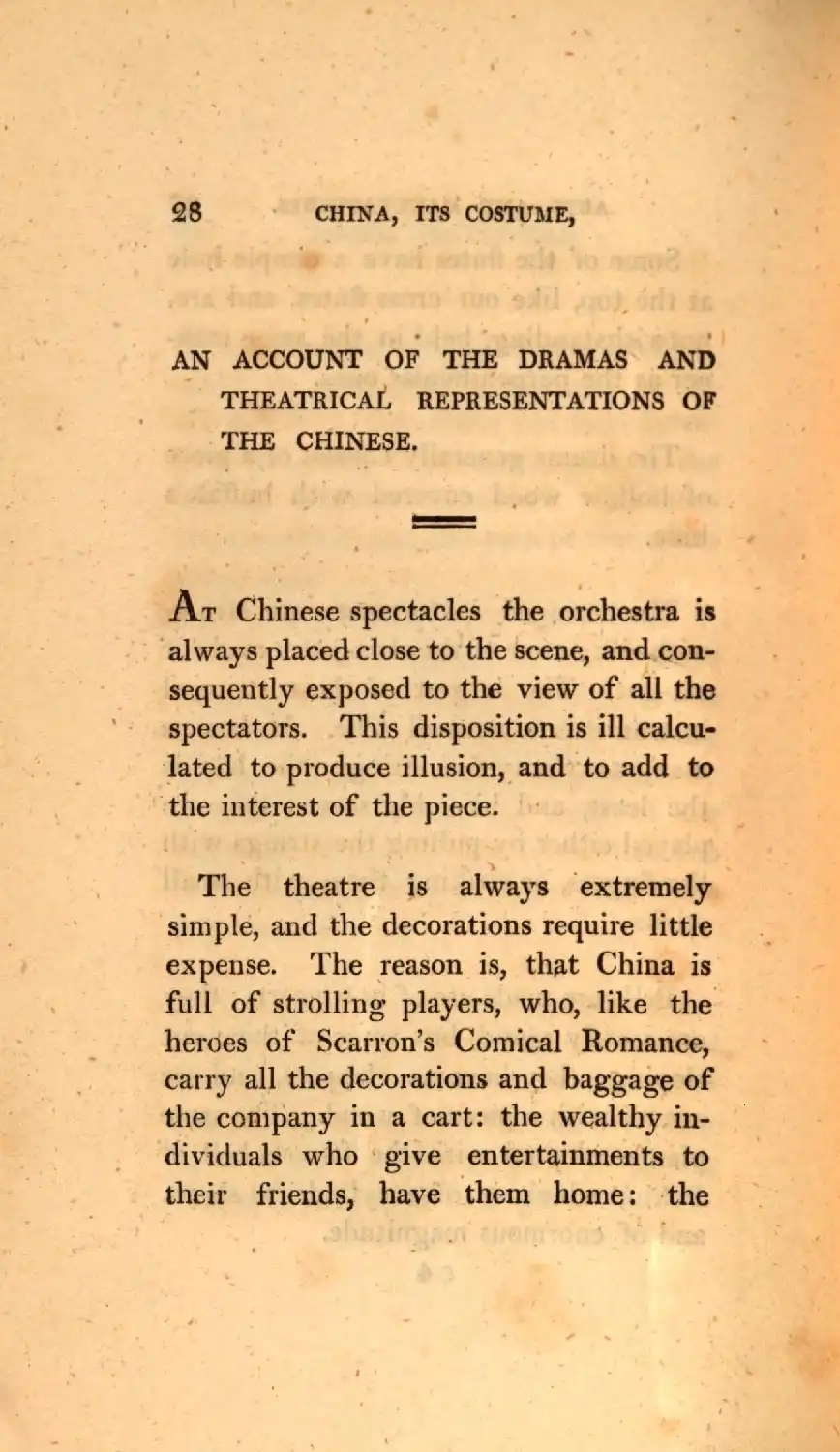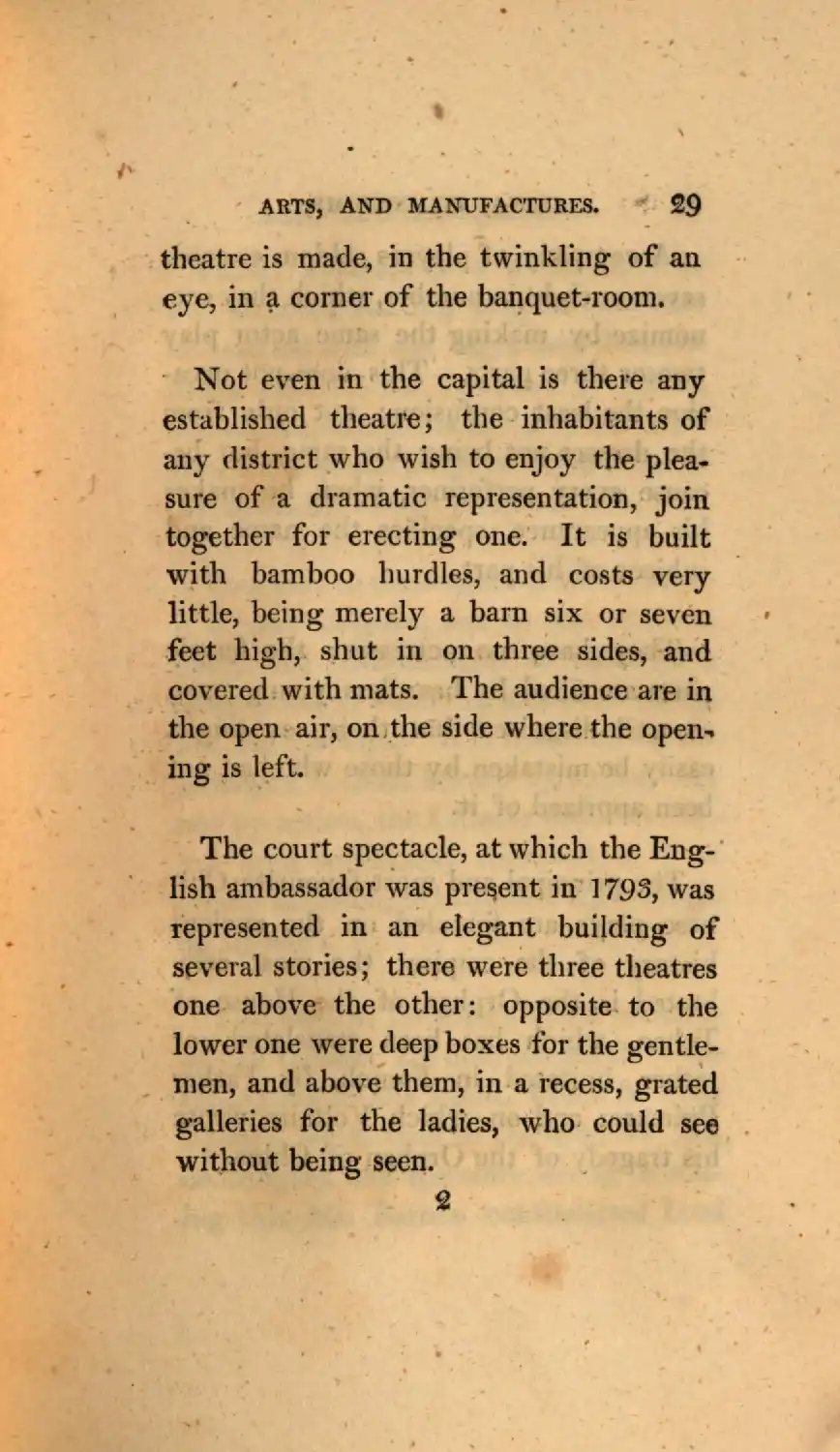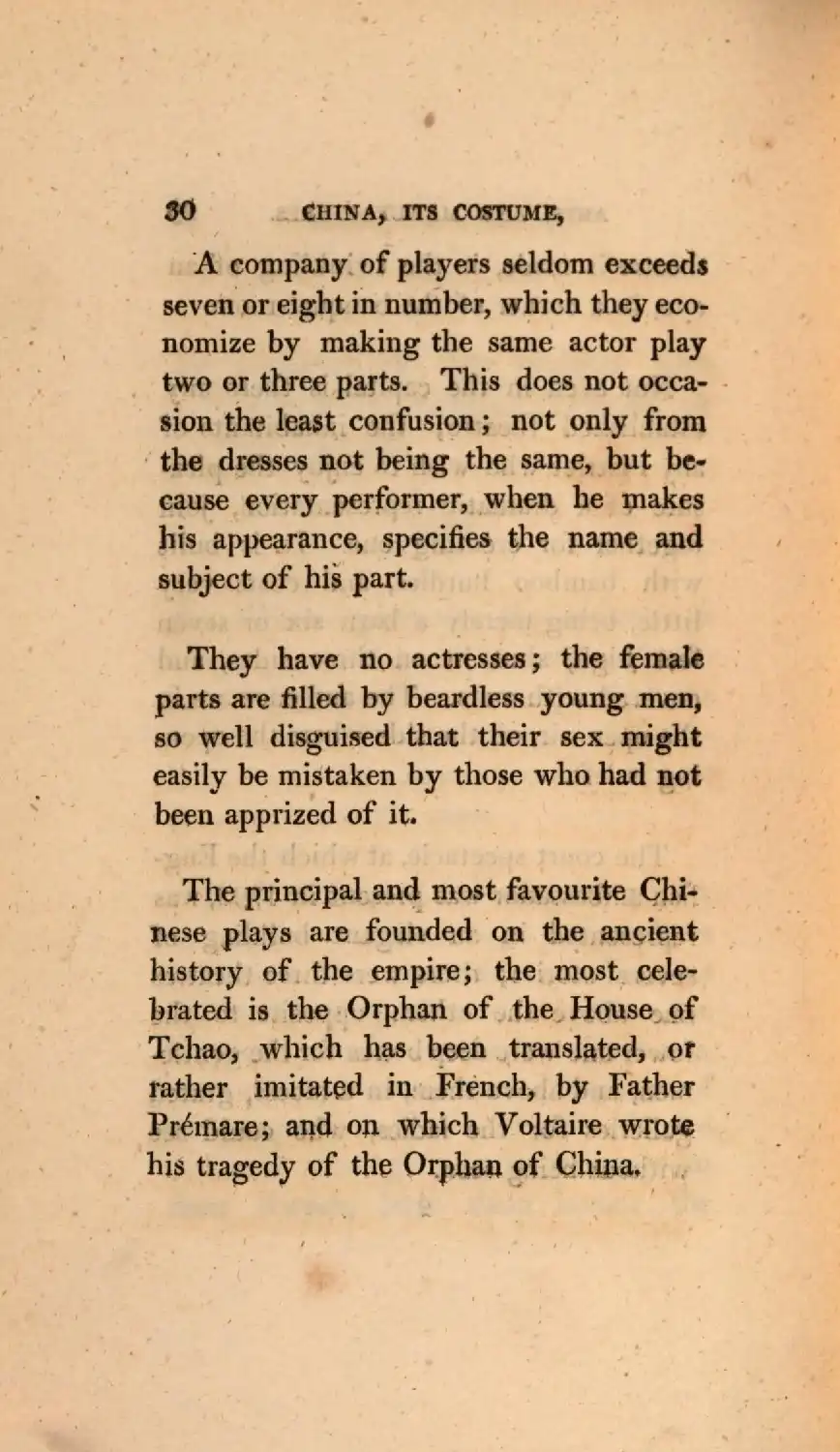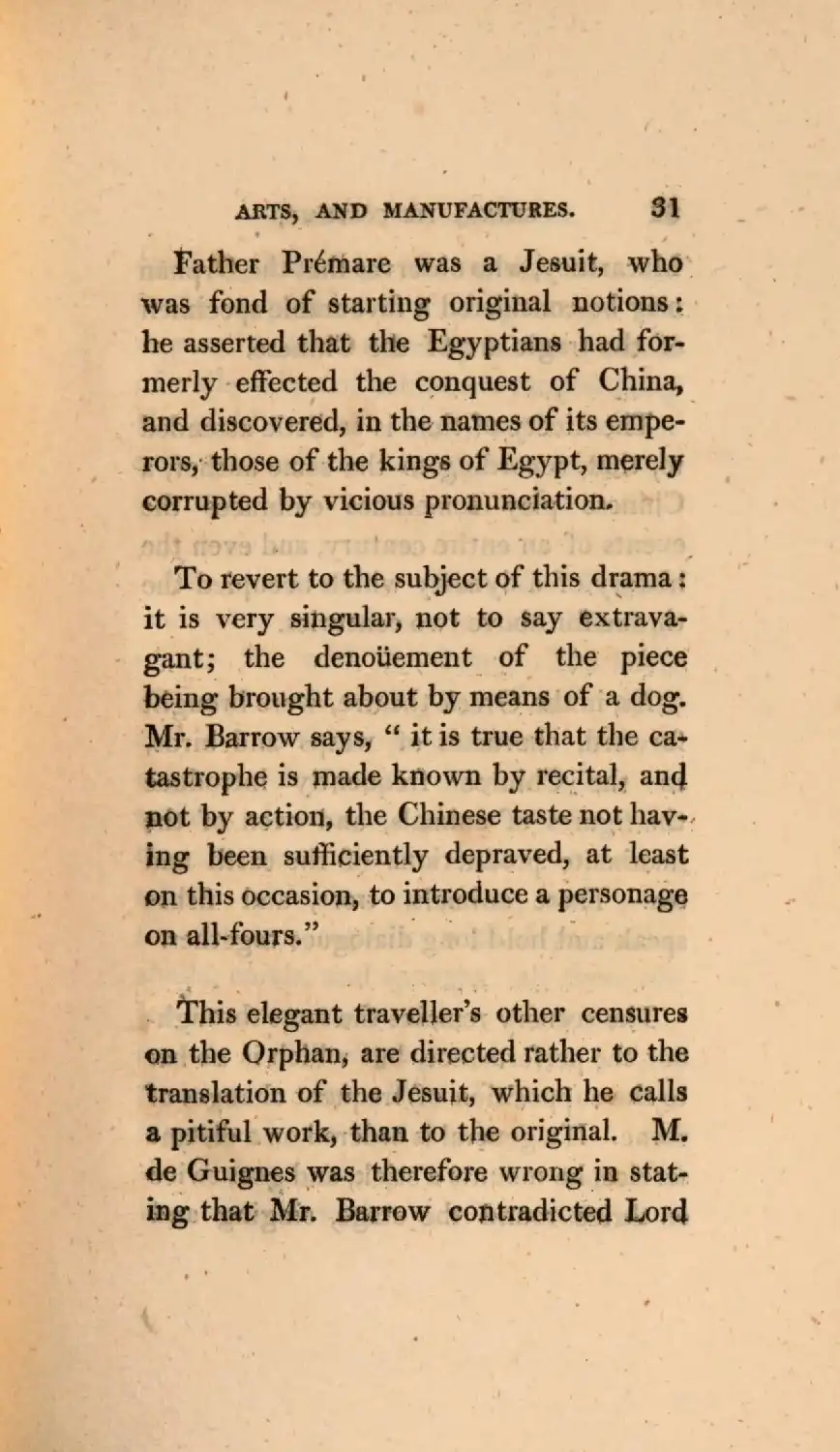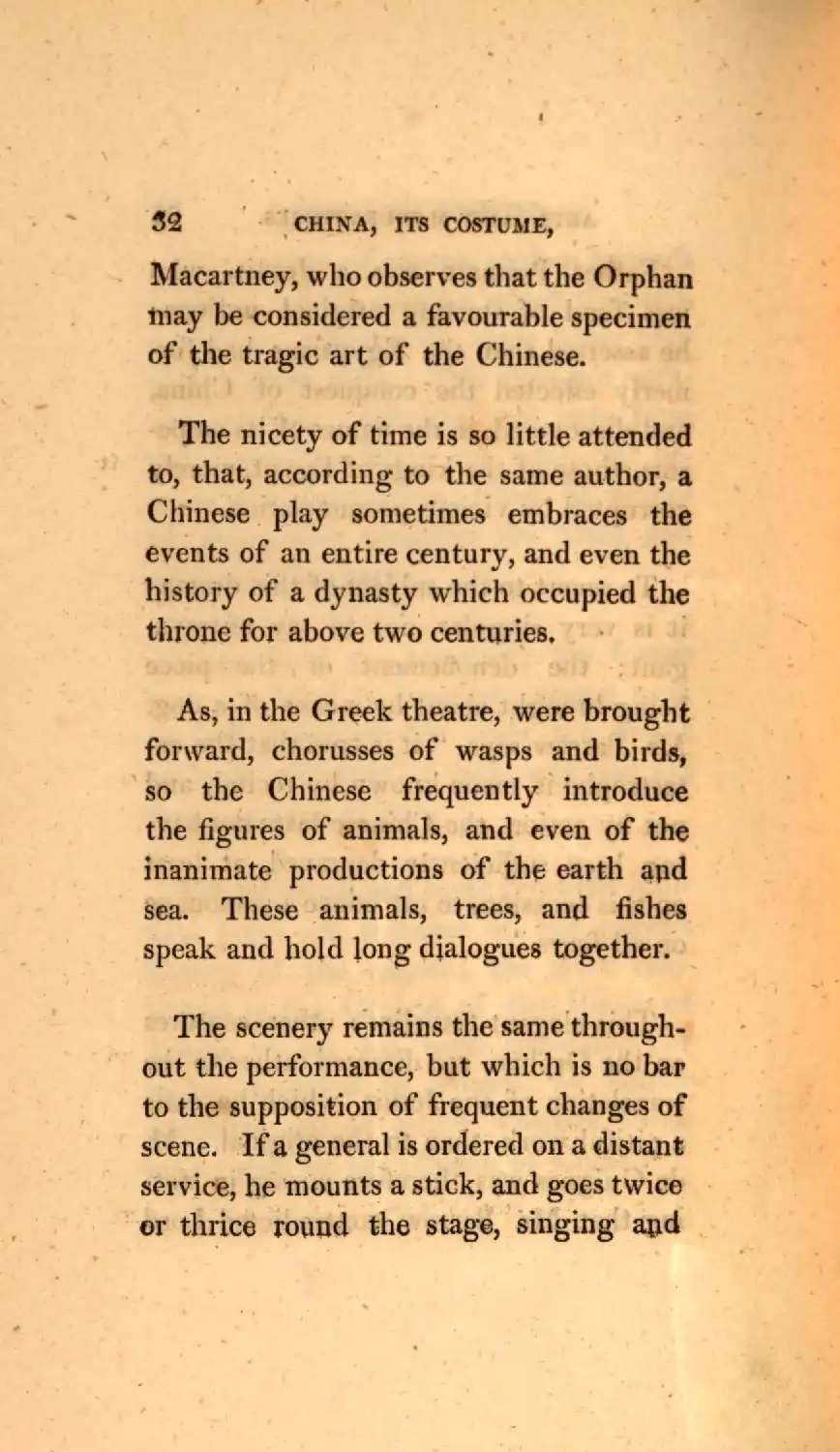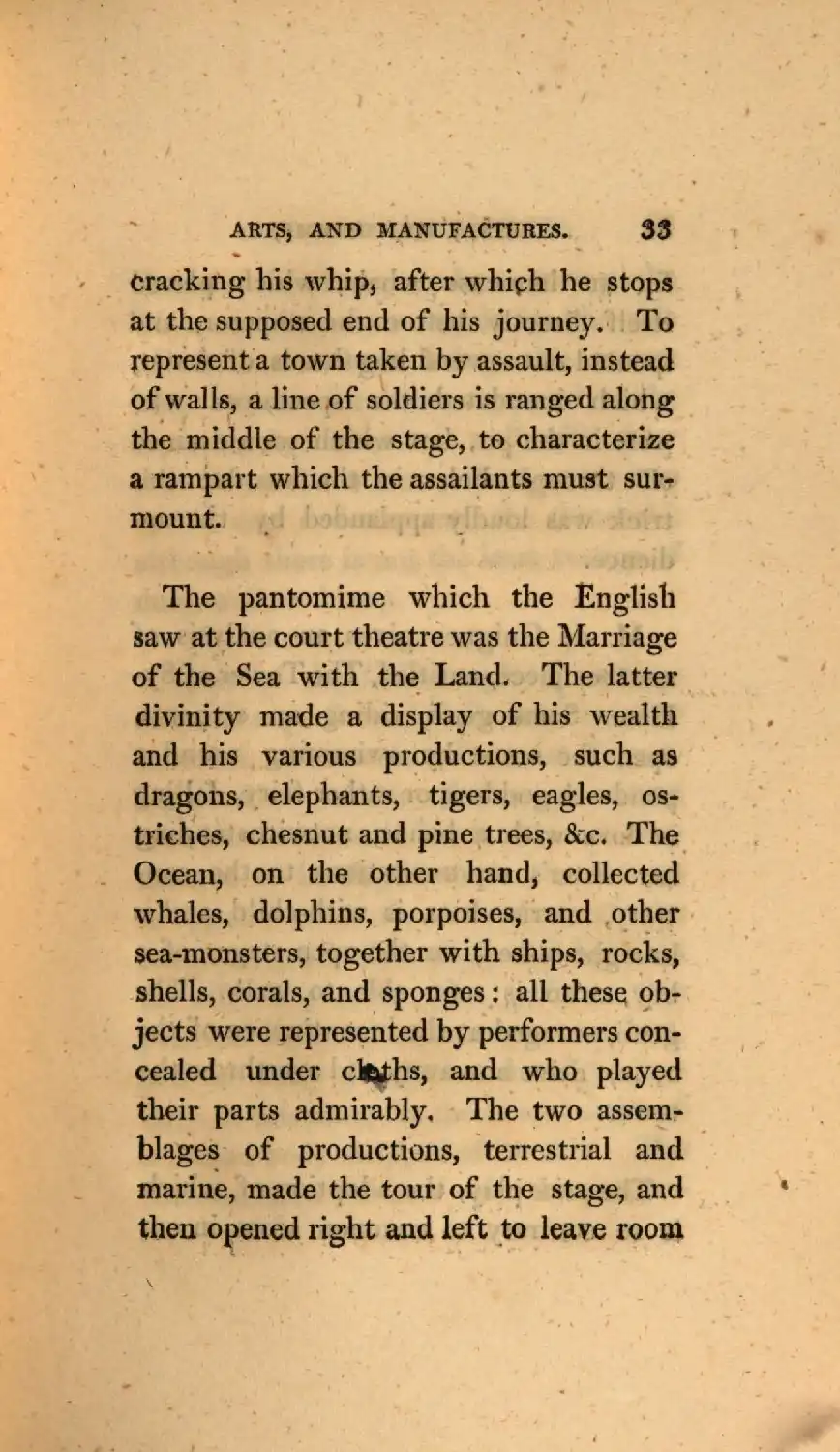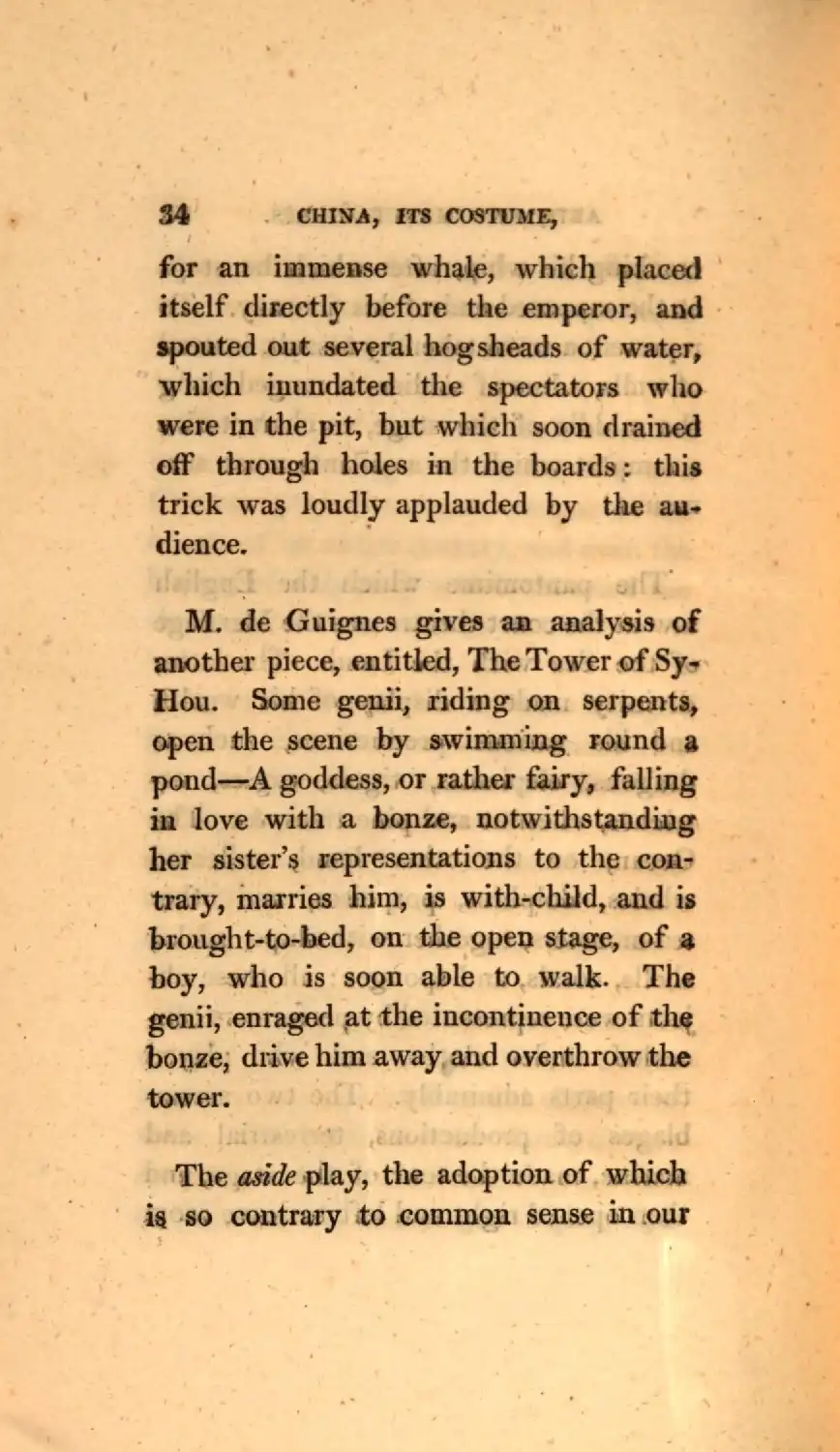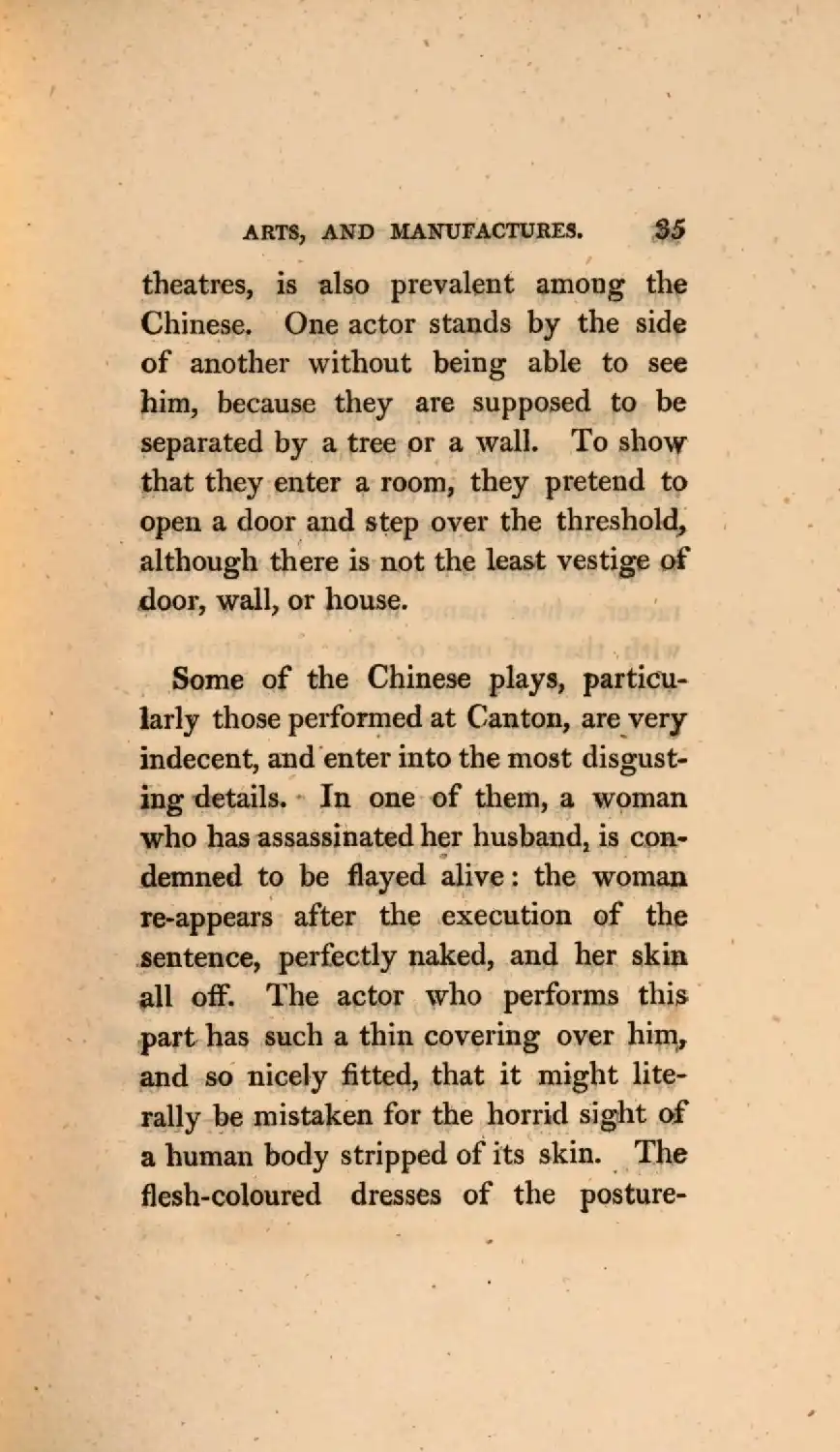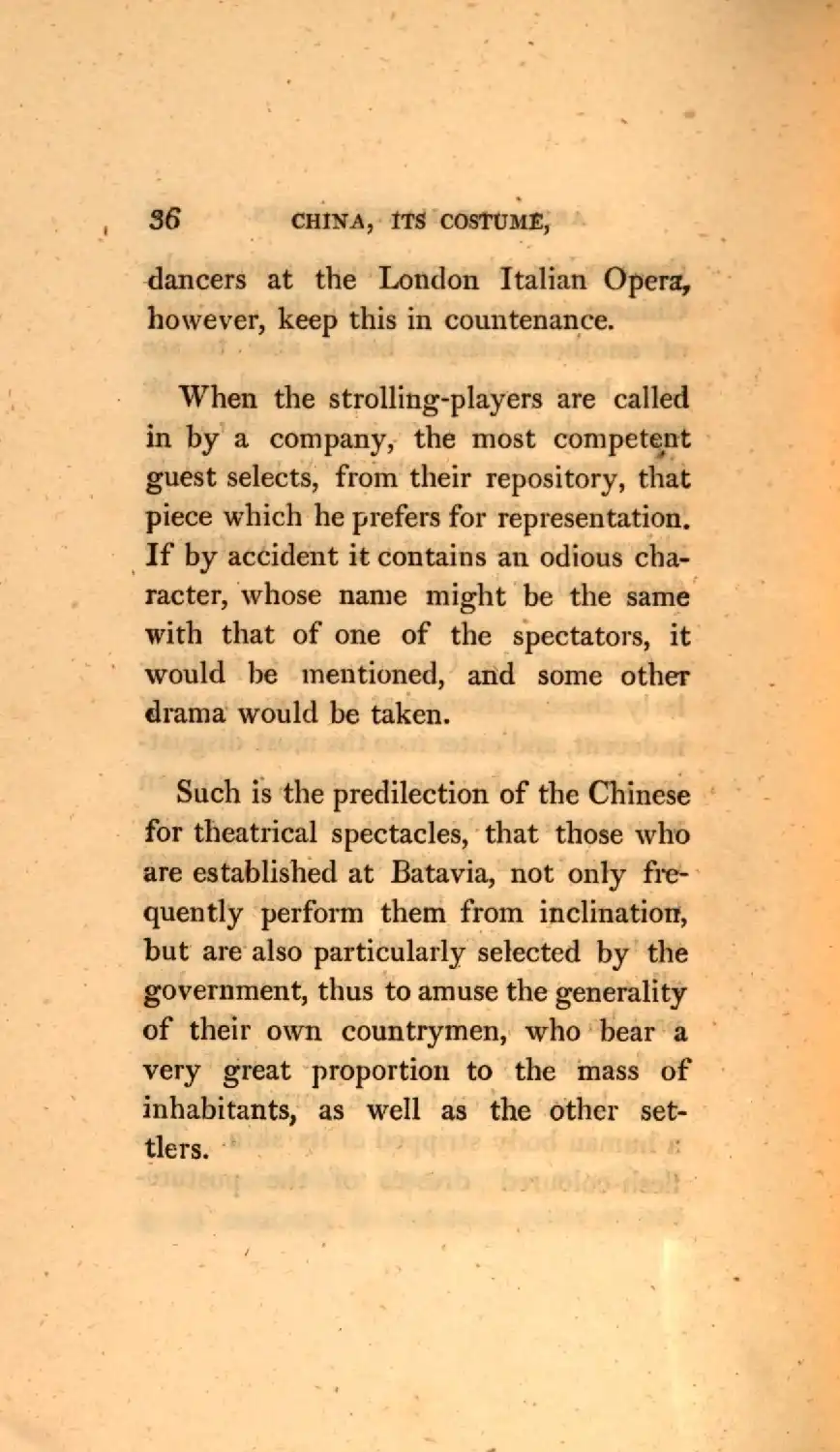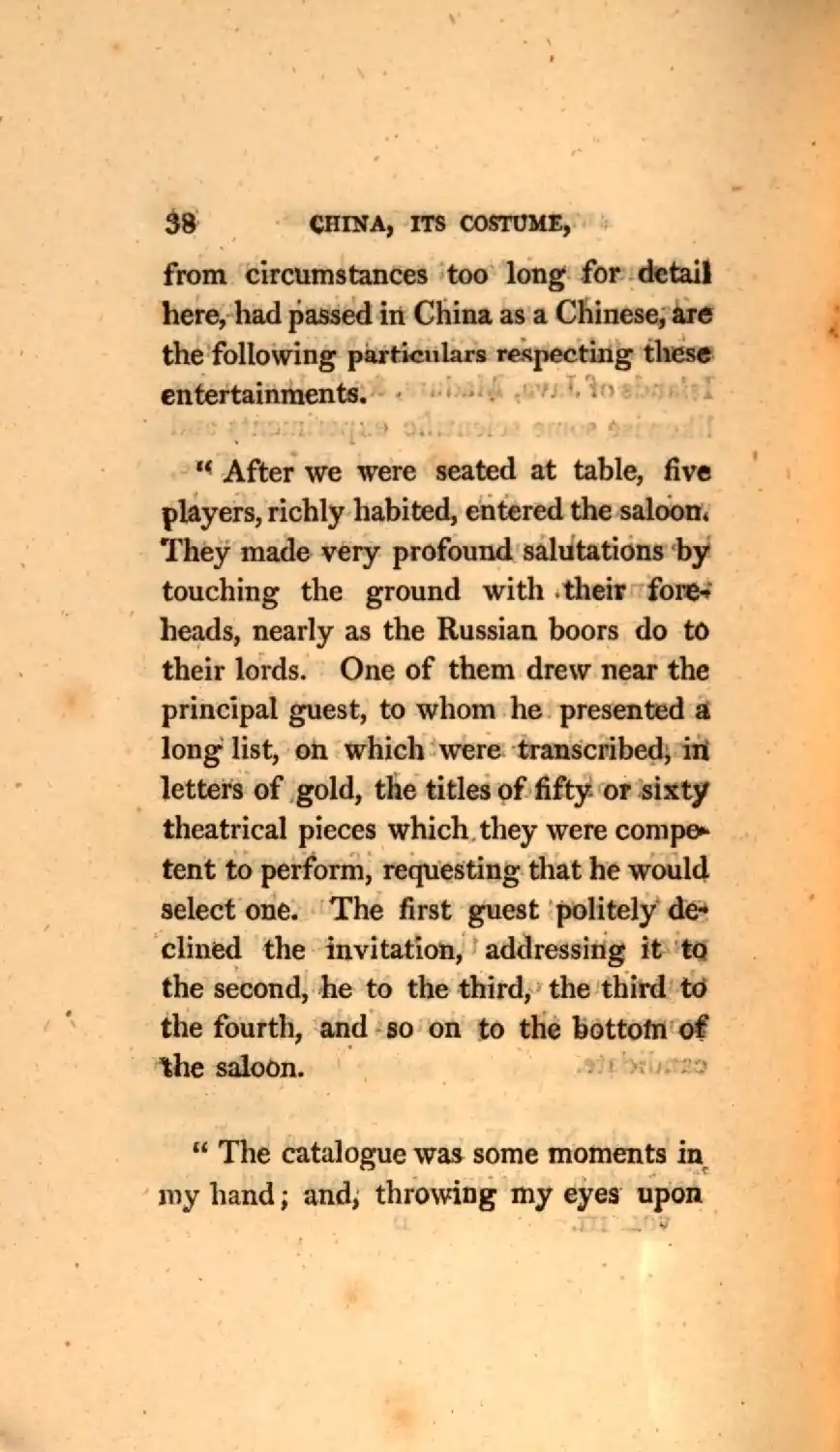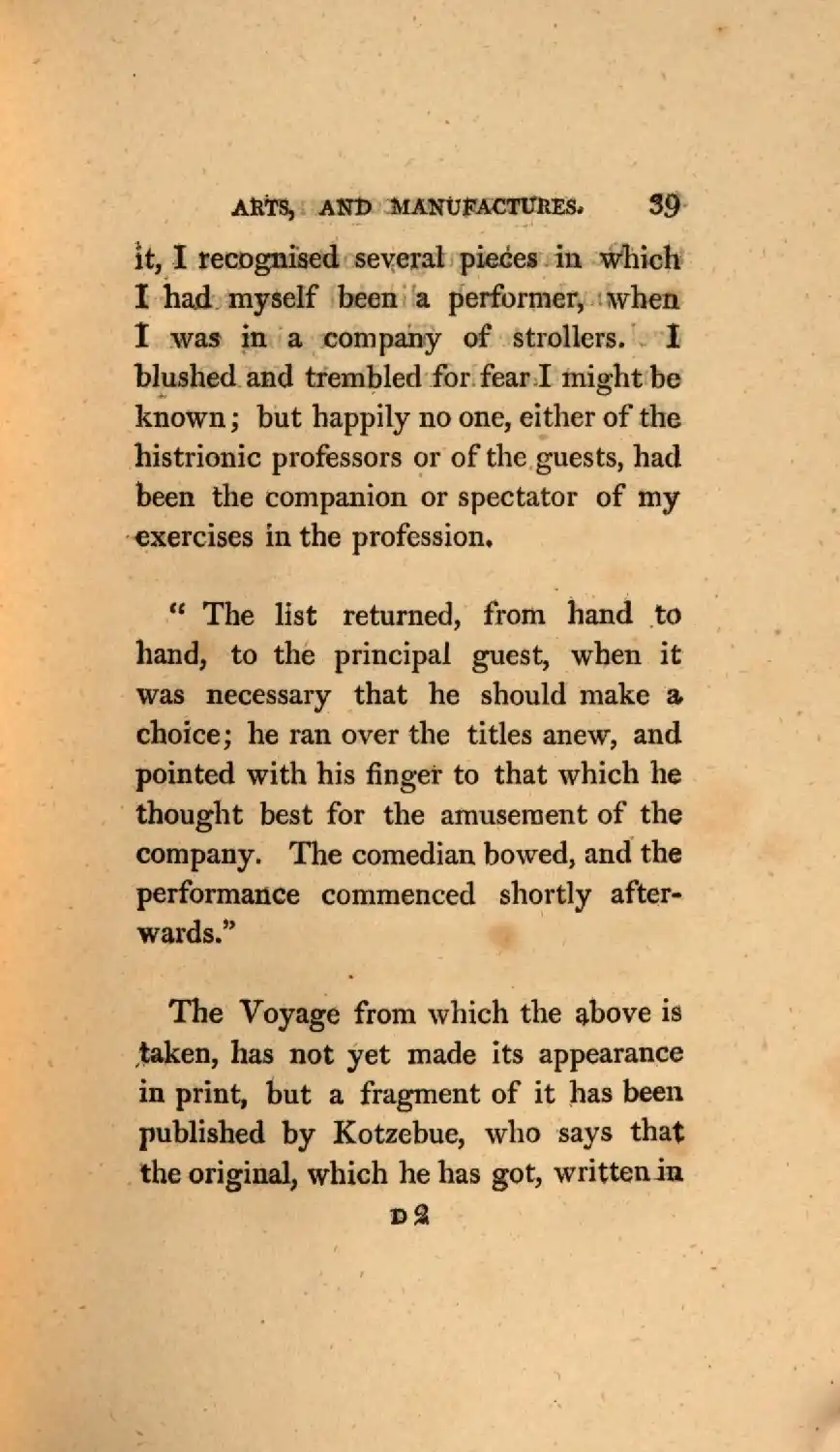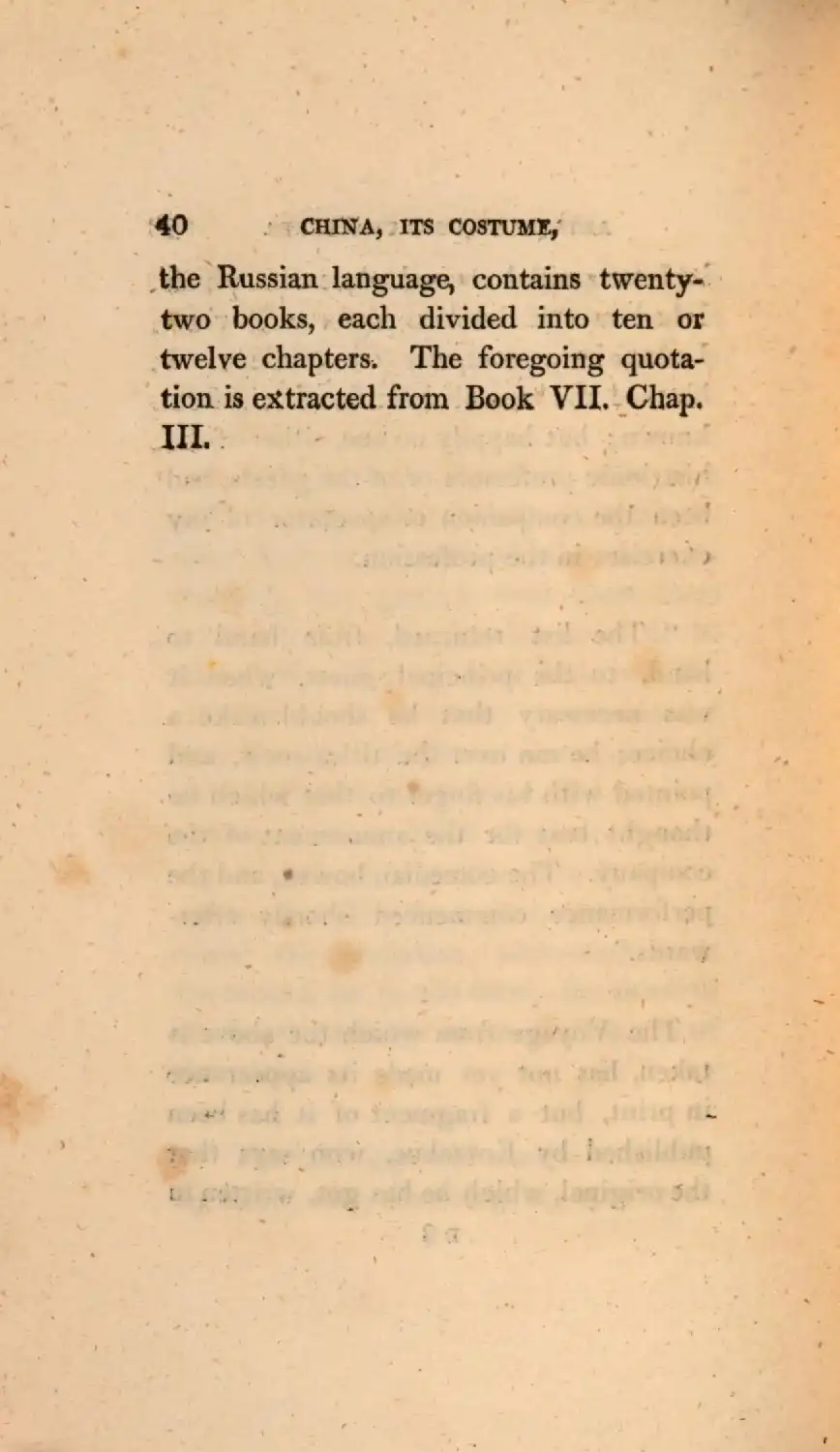China: its Costume, Arts, Manufactures
- Info
- Pages
- Transcript
- Related
AN ACCOUNT OF THE DRAMAS AND THEATRICAL REPRESENTATIONS OF THE CHINESE.
AT Chinese spectacles the orchestra is always placed close to the scene,
and consequently exposed to the view of all the spectators. This
disposition is ill calculated to produce illusion, and to add to the
interest of the piece.
The theatre is always extremely simple, and the decorations require
little expense. The reason is, that China is full of strolling players,
who, like the heroes of Scarron’s Comical Romance, carry all the
decorations and baggage of the company in a cart: the wealthy
individuals who give entertainments to their friends, have them home:
the theatre is made, in the twinkling of an eye, in a corner of the
banquet-room.
Not even in the capital is there any established theatre; the
inhabitants of any district who wish to enjoy the pleasure of a dramatic
representation, join together for erecting one. It is built with bamboo
hurdles, and costs very little, being merely a barn six or seven feet
high, shut in on three sides, and covered with mats. The audience are in
the open air, on the side where the opening is, left.
The court spectacle, at which the English ambassador was present in
1793, was represented in an elegant building of several stories; there
were three theatres one above the other: opposite to the lower one were
deep boxes for the gentlemen, and above them, in a recess, grated
galleries for the ladies, who could see without being seen.
A company of players seldom exceeds seven or eight in number, which they
economize by making the same actor play two or three parts. This does
not occasion the least confusion; not only from the dresses not being
the same, but because every performer, when he makes his appearance,
specifies the name and subject of his part.
They have no actresses; the female parts are filled by beardless young
men, so well disguised that their sex might easily be mistaken by those
who had not been apprized of it.
The principal and most favourite Chinese plays are founded on the
ancient history of the empire; the most celebrated is the Orphan of the
House of Tchao, which has been translated, or rather imitated in French,
by Father Prémare; and on which Voltaire wrote his tragedy of the Orphan
of China.
Father Prémare was a Jesuit, who was fond of starting original notions:
he asserted that the Egyptians had formerly effected the conquest of
China, and discovered, in the names of its emperors, those of the kings
of Egypt, merely corrupted by vicious pronunciation.
To revert to the subject of this drama: it is very singular, not to say
extravagant; the denoüement of the piece being brought about by means of
a dog. Mr. Barrow says, “it is true that the catastrophe is made known
by recital, and not by action, the Chinese taste not having been
sufficiently depraved, at least on this occasion, to introduce a
personage on all-fours.”
This elegant traveller’s other censures on the Orphan, are directed
rather to the translation of the Jesuit, which he calls a pitiful work,
than to the original. M. de Guignes was therefore wrong in stating that
Mr. Barrow contradicted Lord Macartney, who observes that the Orphan may
be considered a favourable specimen of the tragic art of the Chinese.
The nicety of time is so little attended to, that, according to the same
author, a Chinese play sometimes embraces the events of an entire
century, and even the history of a dynasty which occupied the throne for
above two centuries.
As, in the Greek theatre, were brought forward, chorusses of wasps and
birds, so the Chinese frequently introduce the figures of animals, and
even of the inanimate productions of the earth and sea. These animals,
trees, and fishes sneak and hold long dialogues together.
The scenery remains the same through-out the performance, but which is
no bar to the supposition of frequent changes of scene. If a general is
ordered on a distant service, he mounts a stick, and goes twice or
thrice round the stage, singing and cracking his whip, after which he
stops at the supposed end of his journey. To represent a town taken by
assault, instead of walls, a line of soldiers is ranged along the middle
of the stage, to characterize a rampart which the assailants must
surmount.
The pantomime which the English saw at the court theatre was the
Marriage of the Sea with the Land. The latter divinity made a display of
his wealth and his various productions, such as dragons, elephants,
tigers, eagles, ostriches, chesnut and pine trees, &c. The Ocean, on the
other hand, collected whales, dolphins, porpoises, and other
sea-monsters, together with ships, rocks, shells, corals, and sponges:
all these objects were represented by performers concealed under cloths,
and who played their parts admirably. The two assemblages of
productions, terrestrial and marine, made the tour of the stage, and
then opened right and left to leave room for an immense whale, which
placed itself directly before the emperor, and spouted out several
hogsheads of water, which inundated the spectators who were in the pit,
but which soon drained off through holes in the boards: this trick was
loudly applauded by the audience.
M. de Guignes gives an analysis of another piece, entitled, The Tower of
Sy-Hou. Some genii, riding on serpents, open the scene by swimming round
a pond—A goddess, or rather fairy, falling in love with a bonze,
notwithstanding her sister’s representations to the contrary, marries
him, is with-child, and is brought-to-bed, on the open stage, of a boy,
who is soon able to walk. The genii, enraged at the incontinence of the
bonze, drive him away and overthrow the tower.
The aside play, the adoption of which is so contrary to common sense in
our theatres, is also prevalent among the Chinese. One actor stands by
the side of another without being able to see him, because they are
supposed to be separated by a tree or a wall. To show that they enter a
room, they pretend to open a door and step over the threshold, although
there is not the least vestige of door, wall, or house.
Some of the Chinese plays, particularly those performed at Canton, are
very indecent, and enter into the most disgusting details. In one of
them, a woman who has assassinated her husband, is condemned to be
flayed alive: the woman re-appears after the execution of the sentence,
perfectly naked, and her skin all off. The actor who performs this part
has such a thin covering over him, and so nicely fitted, that it might
literally be mistaken for the horrid sight of a human body stripped of
its skin. The flesh-coloured dresses of the posture-dancers at the
London Italian Opera, however, keep this in countenance.
When the strolling-players are called in by a company, the most
competent guest selects, from their repository, that piece which he
prefers for representation. If by accident it contains an odious
character, whose name might be the same with that of one of the
spectators, it would be mentioned, and some other drama would be taken.
Such is the predilection of the Chinese for theatrical spectacles, that
those who are established at Batavia, not only frequently perform them
from inclination, but are also particularly selected by the government,
thus to amuse the generality of their own countrymen, who bear a very
great proportion to the mass of inhabitants, as well as the other
settlers.
Some very interesting and amusing details, on this and various subjects,
may be seen in “Sketches Civil and Military of the Islands of Java,
Madura, &c.” It contains likewise some scientific experiments and
notices on the celebrated Poison Tree, which cannot fail equally to
gratify the literati and those who read merely for entertainment.
They have itinerant players who perform on carts, and bring to mind the
infancy of the Greek theatre; the first attempts of Thespis and his
companions.
The word Tragedy signifies literally the goat's song; a he-goat having
been the prize given for the best production of that nature, or perhaps
the value of it in money at the option of the successful candidate.
In the New Voyage to China by Iwan Tschudrin, a native of Russia, and
who, from circumstances too long for detail here, had passed in China as
a Chinese, are the following particulars respecting these
entertainments.
“After we were seated at table, five players, richly habited, entered
the saloon. They made very profound salutations by touching the ground
with their foreheads, nearly as the Russian boors do to their lords. One
of them drew near the principal guest, to whom he presented a long list,
on which were transcribed, in letters of gold, the titles of fifty or
sixty theatrical pieces which they were competent to perforin,
requesting that he would select one. The first guest politely declined
the invitation, addressing it to the second, he to the third, the third
to the fourth, and so on to the bottom of the saloon.
“The catalogue was some moments in my hand; and, throwing my eyes upon
it, I recognised several pieces in which I had myself been a performer,
when I was in a company of strollers. I blushed and trembled for fear I
might be known; but happily no one, either of the histrionic professors
or of the guests, had been the companion or spectator of my exercises in
the profession.
“The list returned, from hand to hand, to the principal guest, when it
was necessary that he should make a choice; he ran over the titles anew,
and pointed with his finger to that which he thought best for the
amusement of the company. The comedian bowed, and the performance
commenced shortly afterwards.”
The Voyage from which the above is taken, has not yet made its
appearance in print, but a fragment of it has been published by
Kotzebue, who says that the original, which he has got, written in the
Russian language, contains twenty-two books, each divided into ten or
twelve chapters. The foregoing quotation is extracted from Book VII.
Chap. III.
